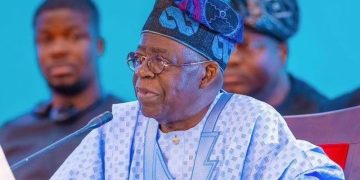The Nigeria Immigration Service (NIS) is set to expand categories of visas issued to foreign citizens intending to visit Nigeria from six to 79 classes of visas under the 2020 Visa Policy to be approved by President Muhammadu Buhari.
It also clarified that the Visa-on-Arrival (VoA) policy does not mean that foreigners will enter Nigeria without visa, saying that VoA is actually not a type of visa but a process that qualifies a foreign citizen on a short visit to have his visa process at the airport.
The visa expansion would enable Nigeria to resolve the age-long issue of wrong classifications and validity of visas granted foreigners coming to Nigeria and reposition the nation’s immigration practice to serve the current needs on integration.
Comptroller-General of the NIS, Mr. Muhammed Babandede, who was the guest speaker at a breakfast meeting of the Nigeria-South Africa Chamber of Commerce, unfolded the visa category expansion plan yesterday in Lagos.
He spoke on the topic: “The True Situation of Immigration Service in Nigeria Today and Prospects for The Future”.
Babandede said Nigeria’s Visa 2020 Policy comprised three broad categories, which are the Short Visit Visas (SVV), Temporary Resident Visa (TRV) and Permanent Resident Visa (PRV).
He said: “It is proposed that we will have 79 classes of visa. There will be visa for Nigerians in diaspora. It will introduce visitors’ visa. It will enable Nigeria to issue up to five-year multiple visas to citizens of those countries that offer Nigerians such multiple-year visas. There are visas for foreign citizens who worked and retired in Nigeria and those who worked and retired outside the country but desired to settle in Nigeria. It is a very kind of innovation, which seeks to address any need foreigners have for visiting Nigeria.
“The current business visa is going to be unbundled into more than 30 categories of visas. The aim is to align our visa processes to federal government’s policies and contribute to the attainment of Economic Recovery and Growth Plan.”
He identified the vision of the NIS as supporting people coming to do business in the country in a manner that does not jeopardise Nigeria’s national security.
According to him, some of the features of the 2020 Visa Policy include the granting of social visas to visitors desiring to visit Nigeria for religious purposes, sports events and others that need to visit their family members who are residing in Nigeria.
The new visa policy would also accommodate education visa for those desiring to study in Nigeria.
“Our visa categories were mainly for those on business visit without catering for those on tourism and social visits. It means there is need for visas to address their needs and resolve wrong classification of visas, issues on validity of visa and eradicate poor use of discretions in issuing certain categories of visas,” Babandede added.
He explained that the new policy would address the problem of interchangeable use of passports for single return journey by Nigerians abroad with dual nationalities but visiting Nigeria without visa on their passports.
“This distorts people’s travel histories. We expect to see visa in every passport coming to Nigeria which they do not have. So, we decided to create a class of visa for this class of Nigerians,” he added.
The NIS boss, who was represented by Comptroller of Immigration, Mr. Kunle Osisanya, said the policy also created a legal and official basis for Nigeria to reciprocate the issuance of multiple-year visas some countries grant to Nigerians.
“In the past, we rely on discretion that had no legal backing as the current law permits a maximum of 90 days visa.
“We are introducing social visits visa for those that want to visit their family members in Nigeria. Previously, there was no visa category for family members of expatriates in Nigeria to visit them. We are now addressing it. This visa will now enable family and friends to come.
“Also, clergies, journalists, sportsmen visiting Nigeria will now have suitable visas instead of using business visa. Now there will be a suitable visa for you no matter what kind of visit you want.
“Also, those Nigerians who normally travel abroad to have babies will now have the right kind of visa for their babies. They can apply for visa on arrival for these babies without going to Nigerian embassies in the country they delivered their babies.
“Similarly, Nigerians by birth who renounced their Nigerian citizenship because the countries they live do not allow dual citizenship will be issued with an indefinite resident and multiple visa to enable them visit Nigeria whenever they wished. Their spouses will be able to benefit from this also,” he said.
Also, investors with substantial capital importation to the country would be granted resident visa as long as the capital is in Nigerretir
Clarifies Visa-on-arrival Policy
Meanwhile, the comptroller general has also clarified that the Visa-on-arrival (VoA) policy does not mean that foreigners will enter Nigeria without visa.
“The VoA is actually not a type of visa. It is a process that qualifies a foreign citizen on a short visit to have his visa process at the airport.
“The VoA was for citizens of African Union countries to promote trade and continental integration and facilitate the implementation of African Continental Free Trade Area (AfCFTA).
“Sometime last year there was a lot of controversy over VoA, which people misconstrued as visa free entry into the country. The president never said that. What the president announced was VoA for citizens of African Union countries and holders of African Union passports. It is not for Africans who are not carrying AU’s passports. This is for citizens of AU countries. The initiative is from AU as measures to promote integration and trade in Africa. It will also aid AfCFTA.
“For those of you who are planning to float an airline, this VoA policy is capable turning Nigeria into an aviation hub in Africa like what we have in Ethiopia. Also for those who want to arrange tourism packages this policy will present a good opportunity,” Babandede said.
According to him, the ravaging Coronavirus is an issue of concern to NIS.
“Remember we are the first line. However this is a professional area. Medical issues are not within our area of competence. We rely on advice from the Federal Ministry of Health through the National Port Health Services. Once they advise us that we need to take measures, just as it happened at the height of Ebola, I will assure all Nigerians that the NIS will be equal to the task,” he explained.
































